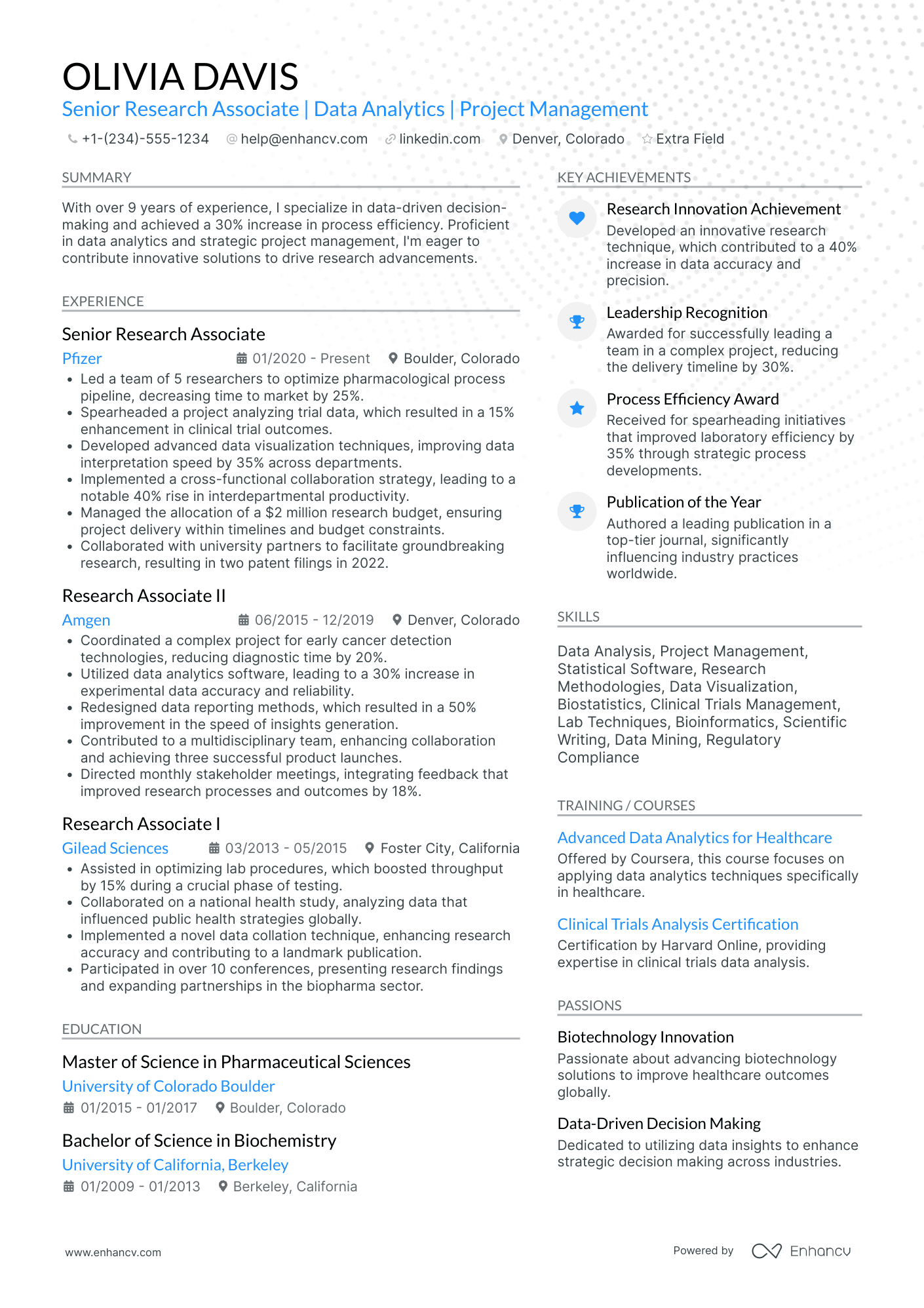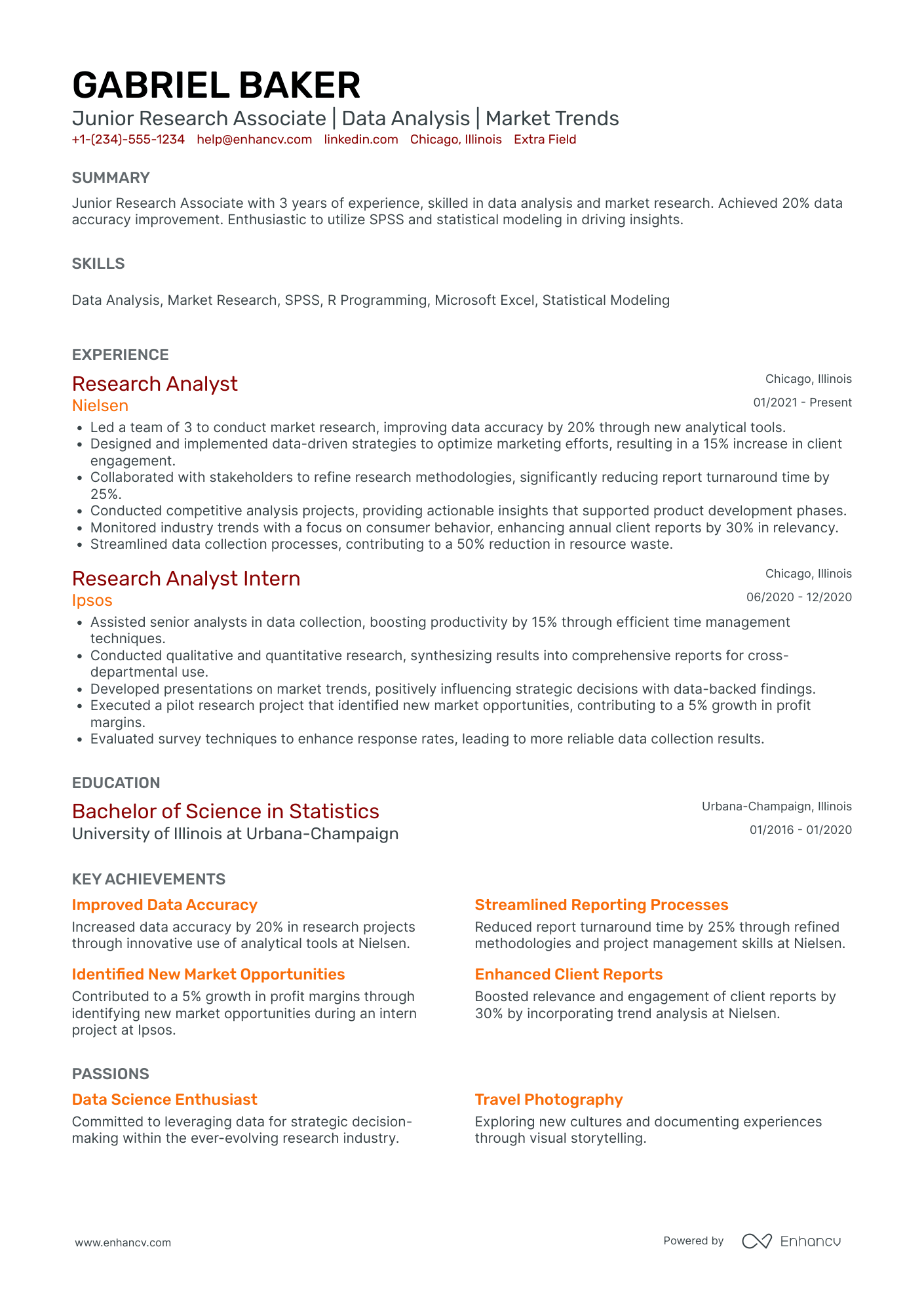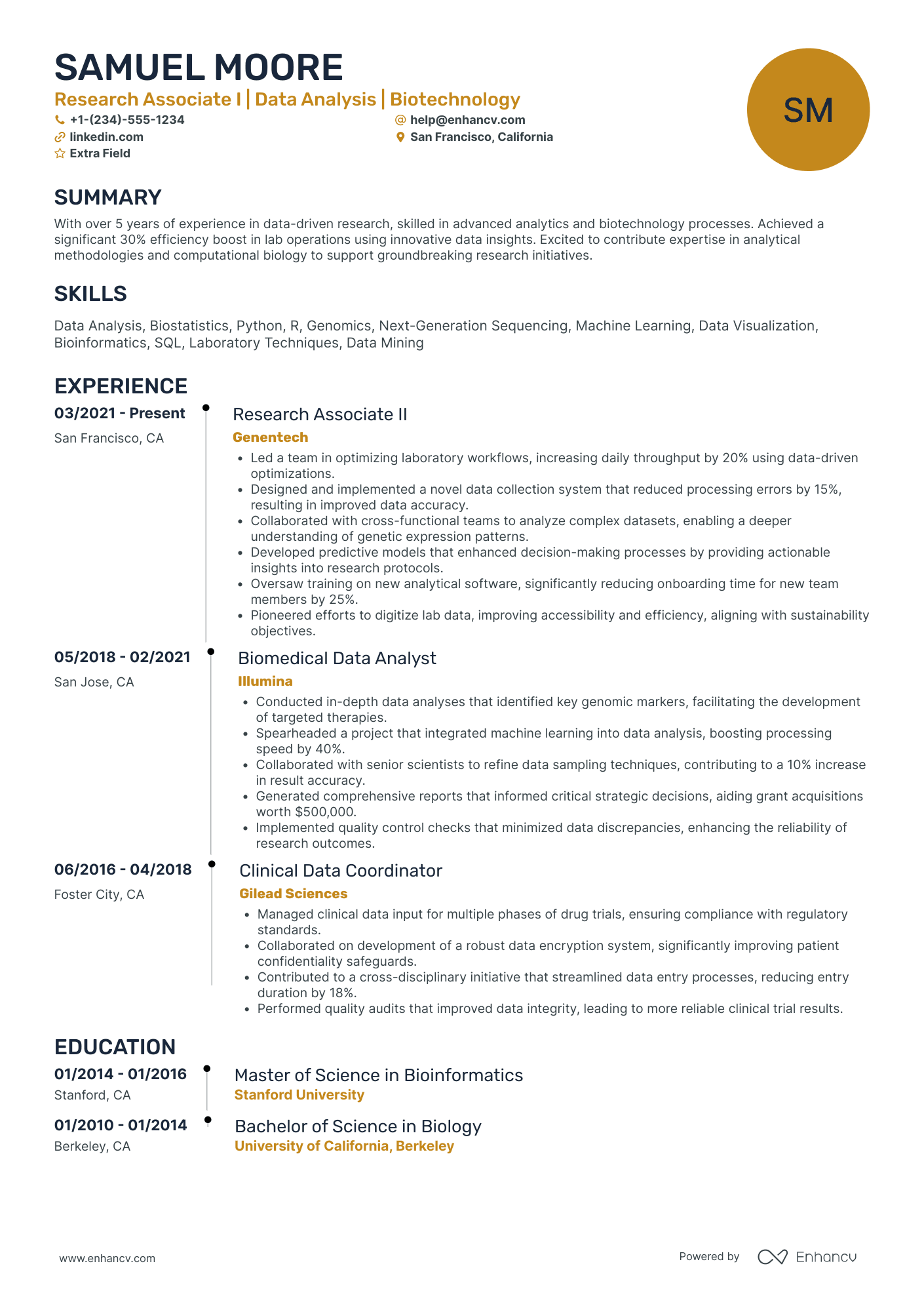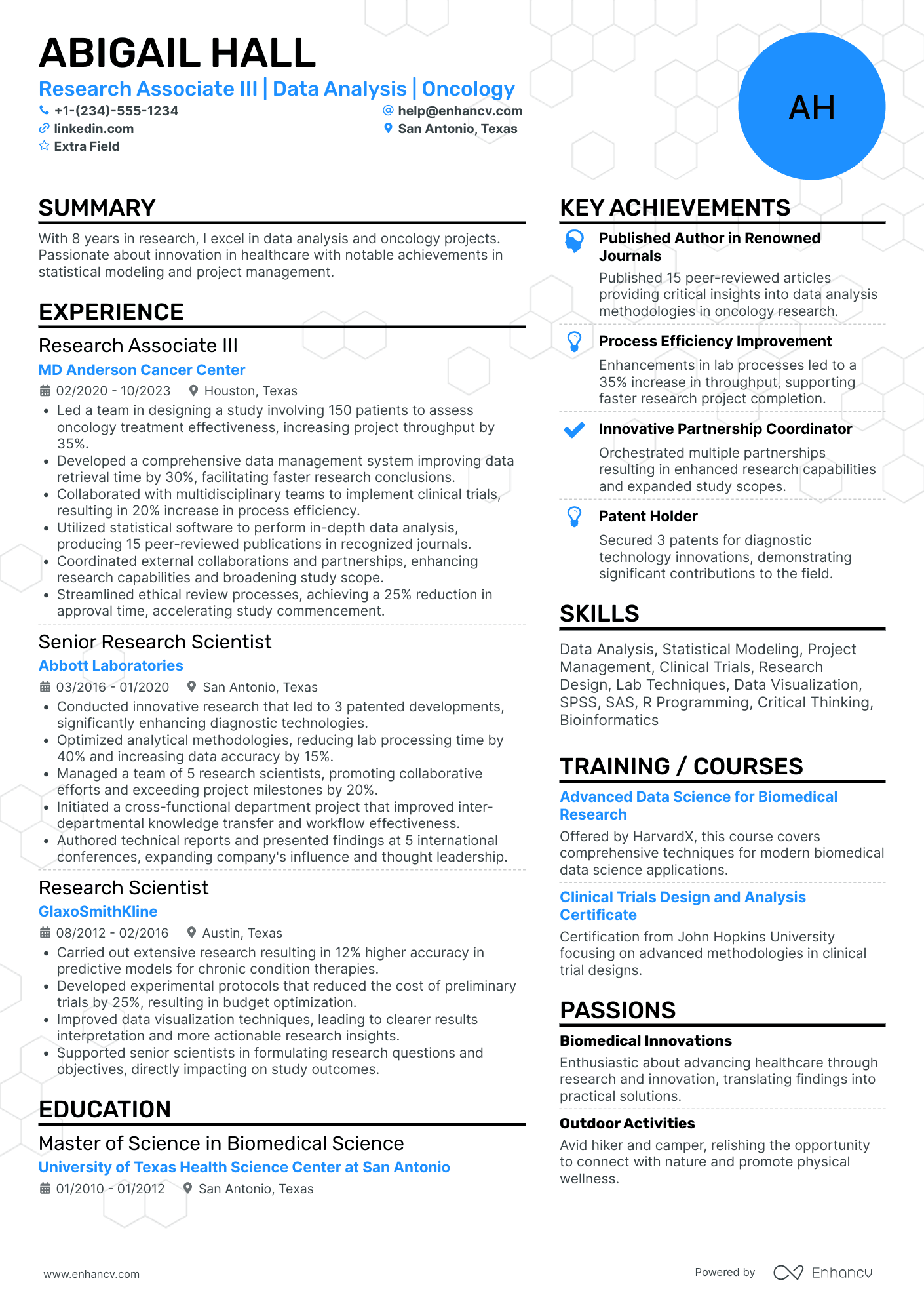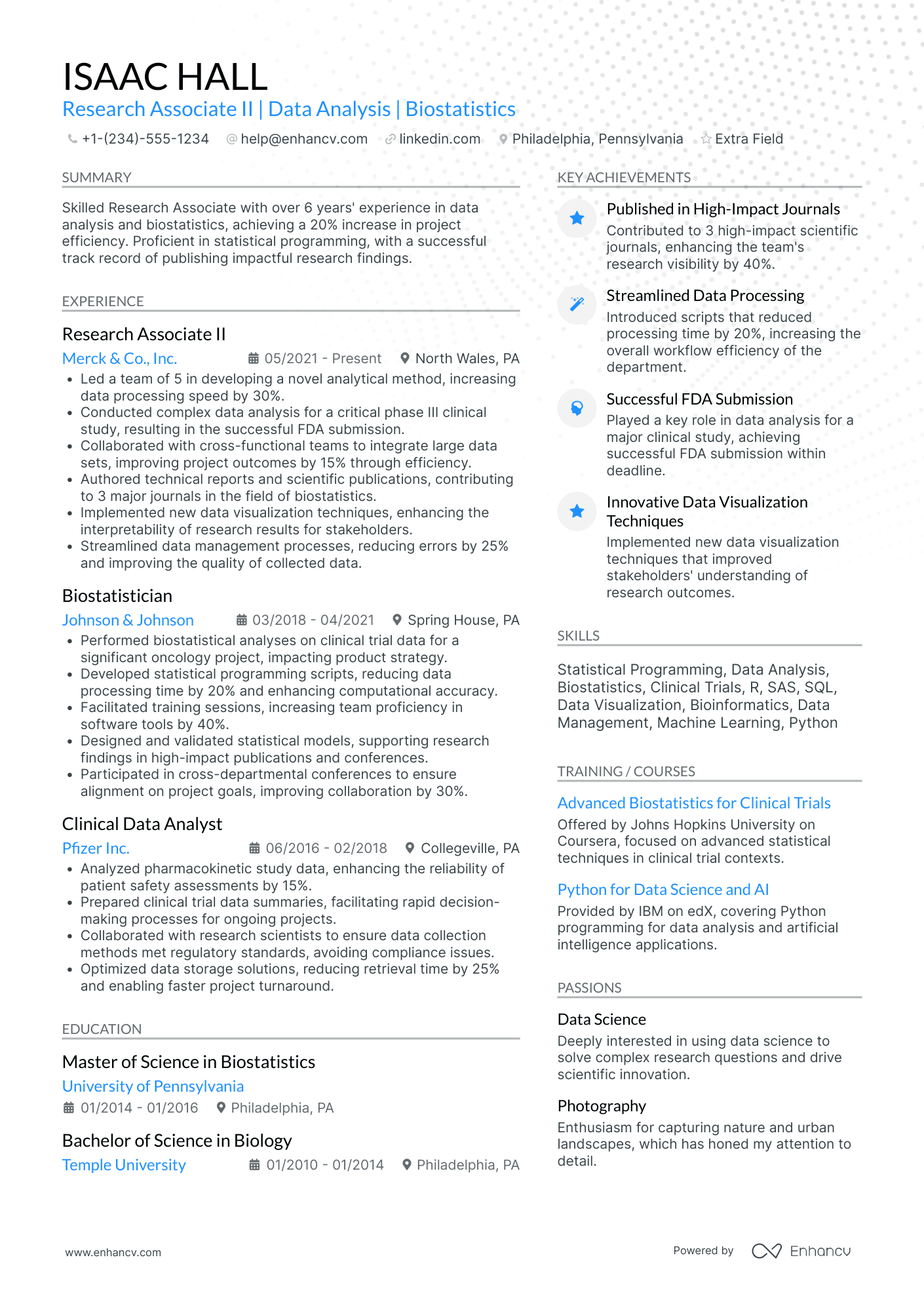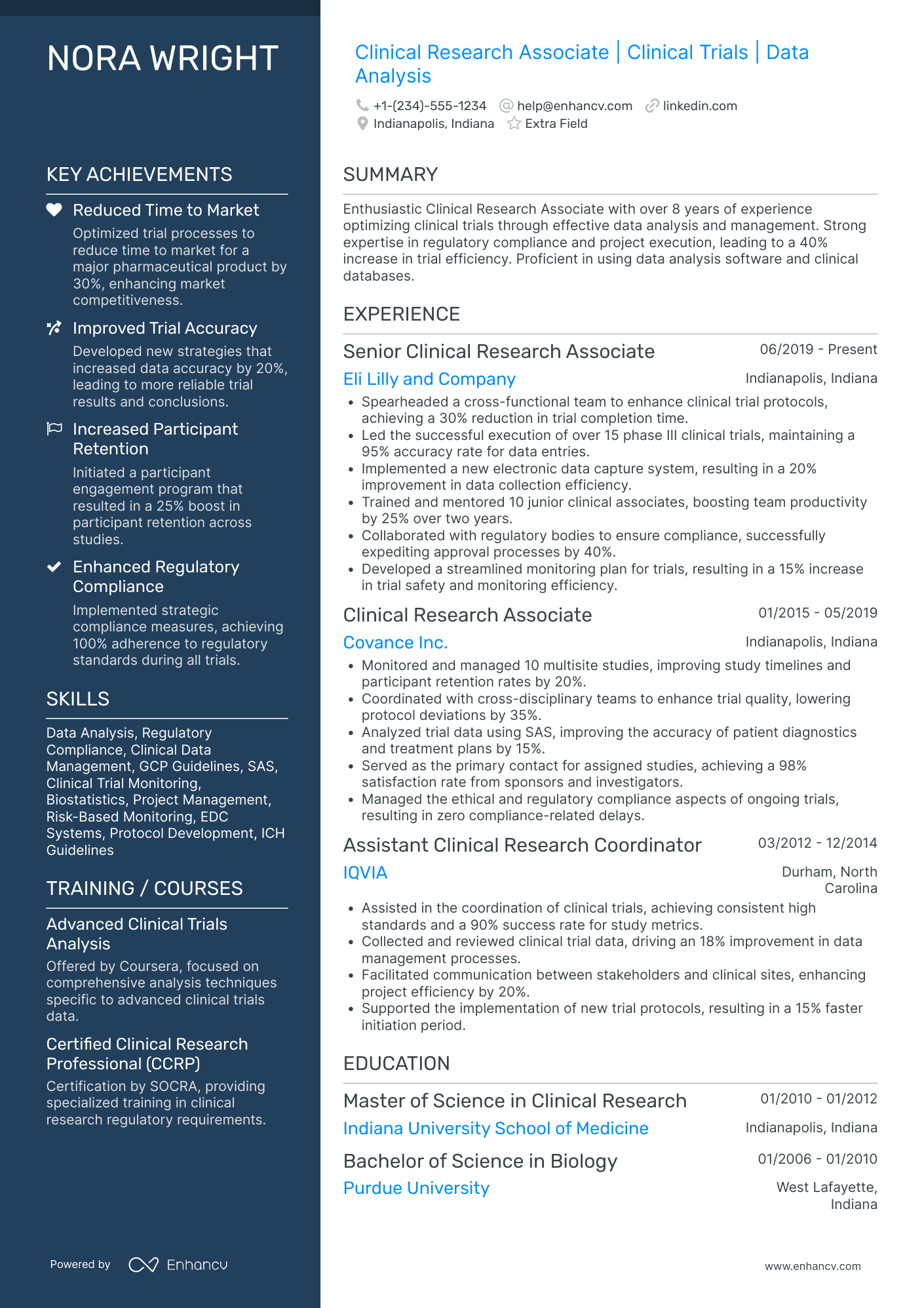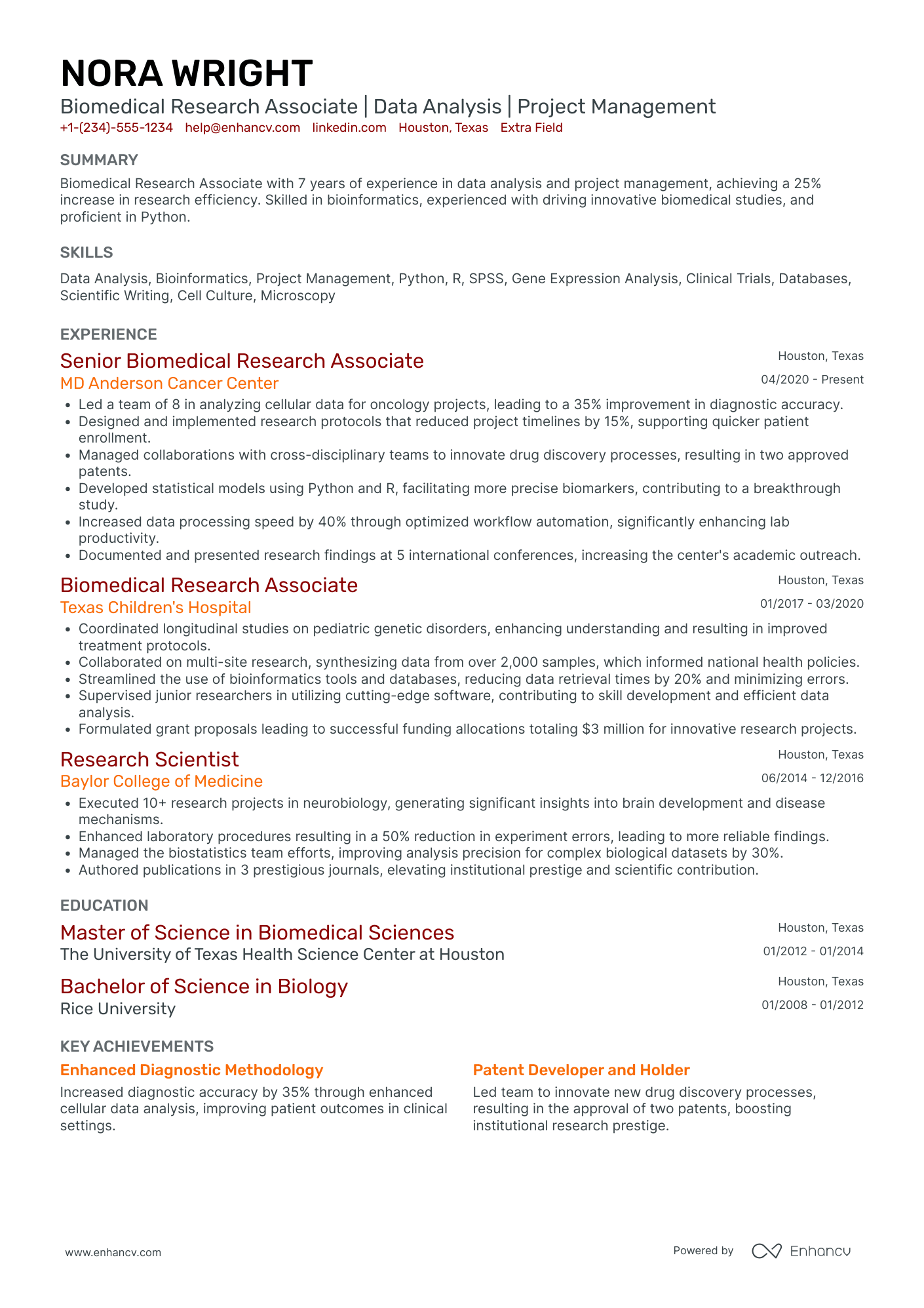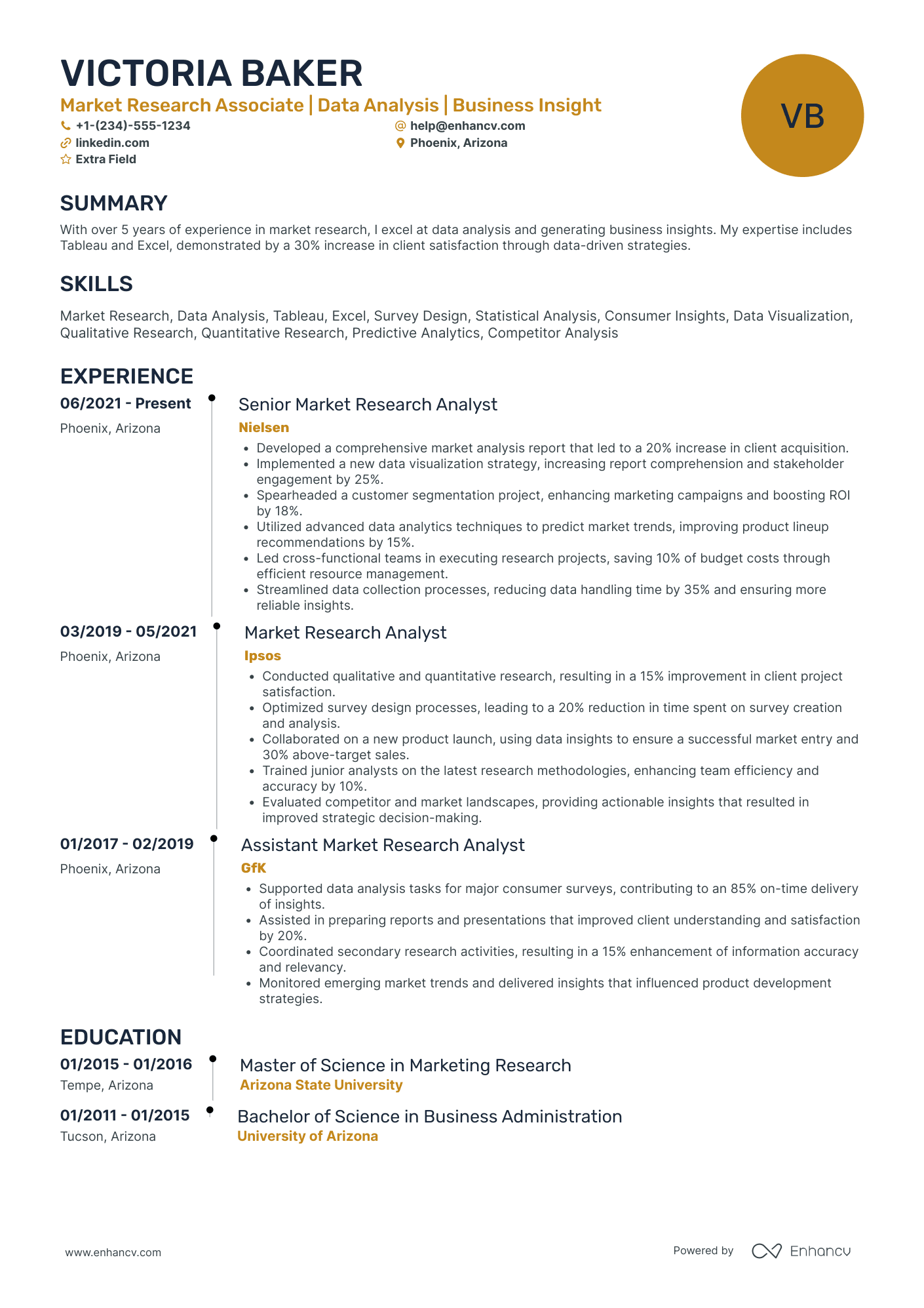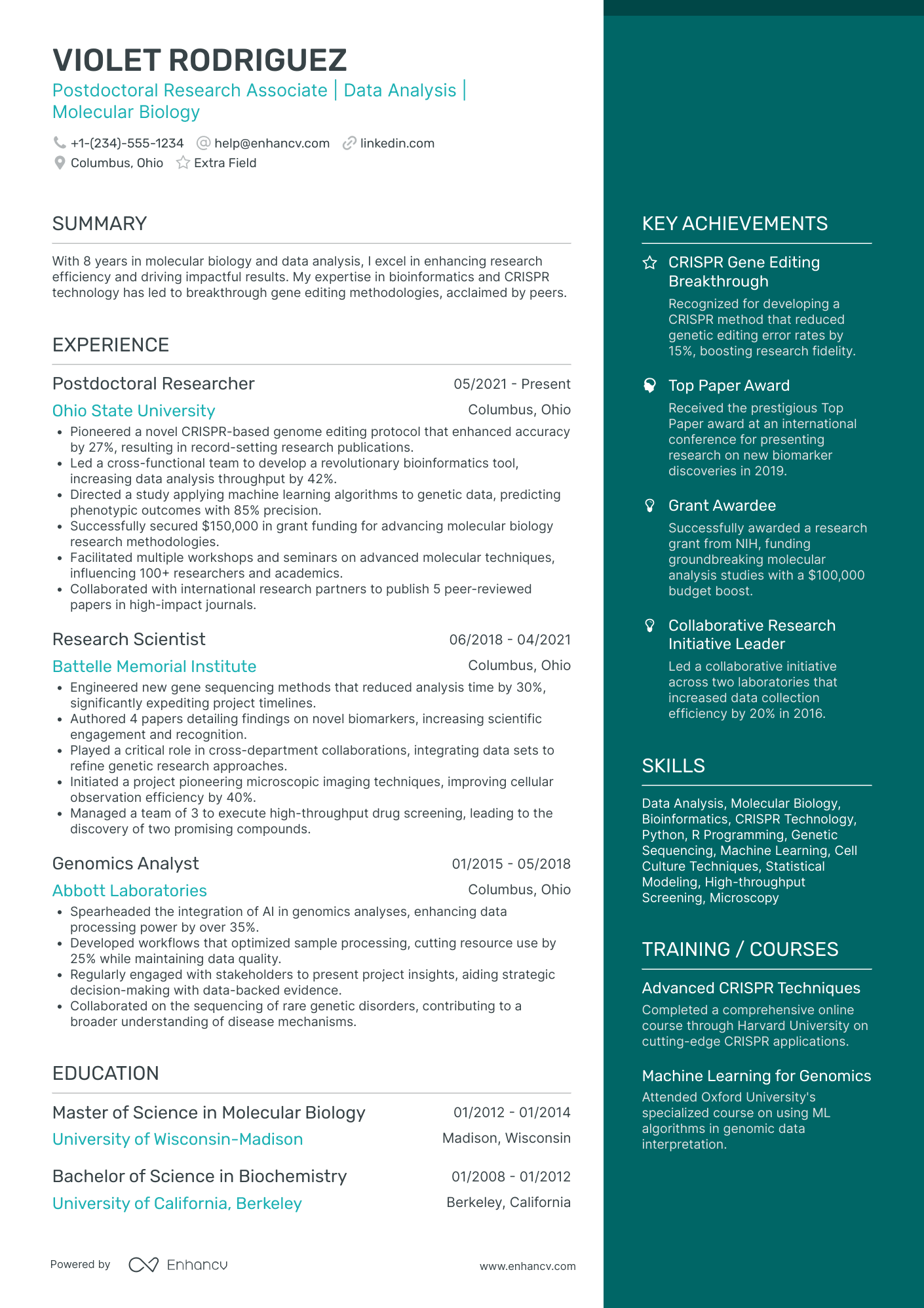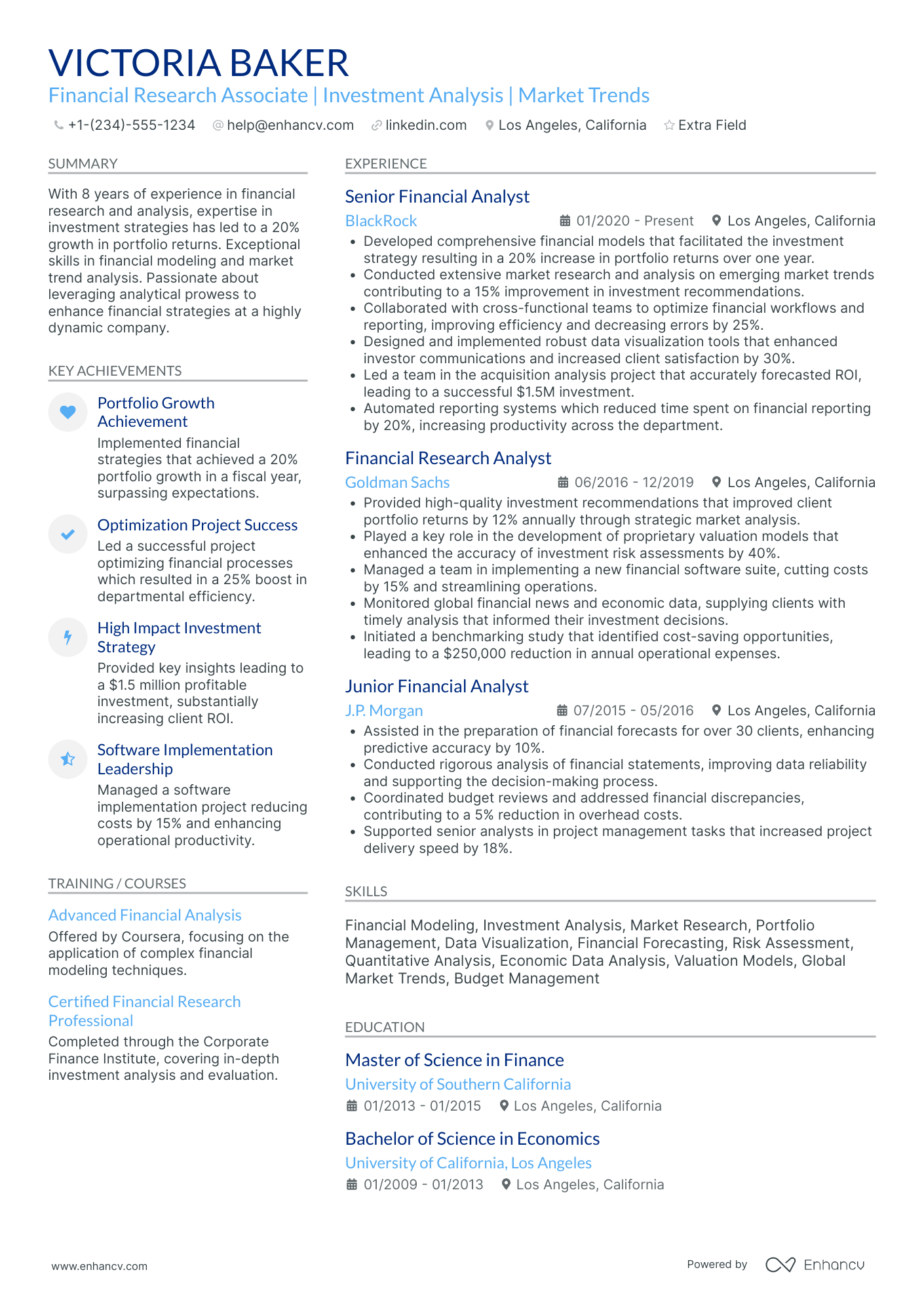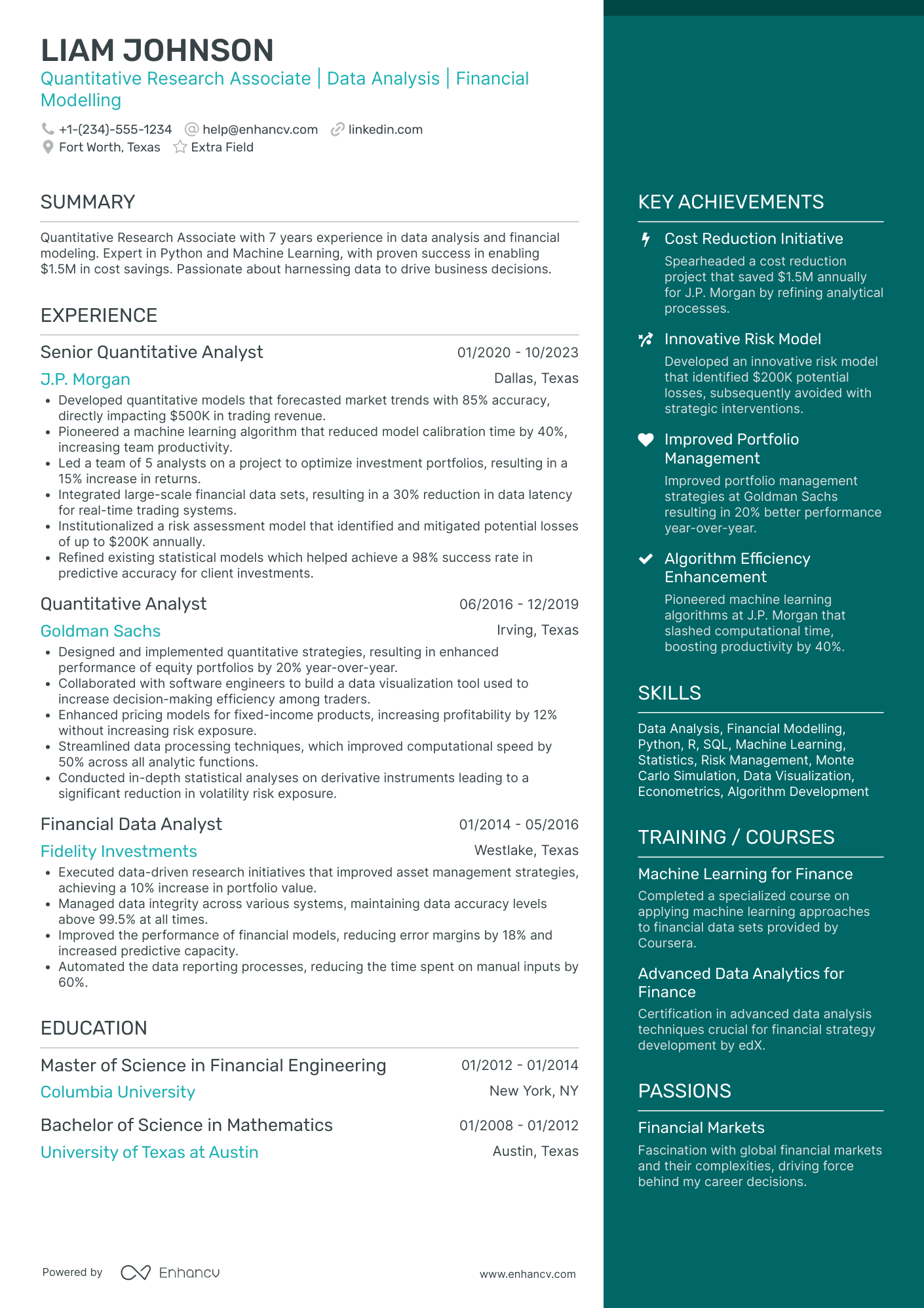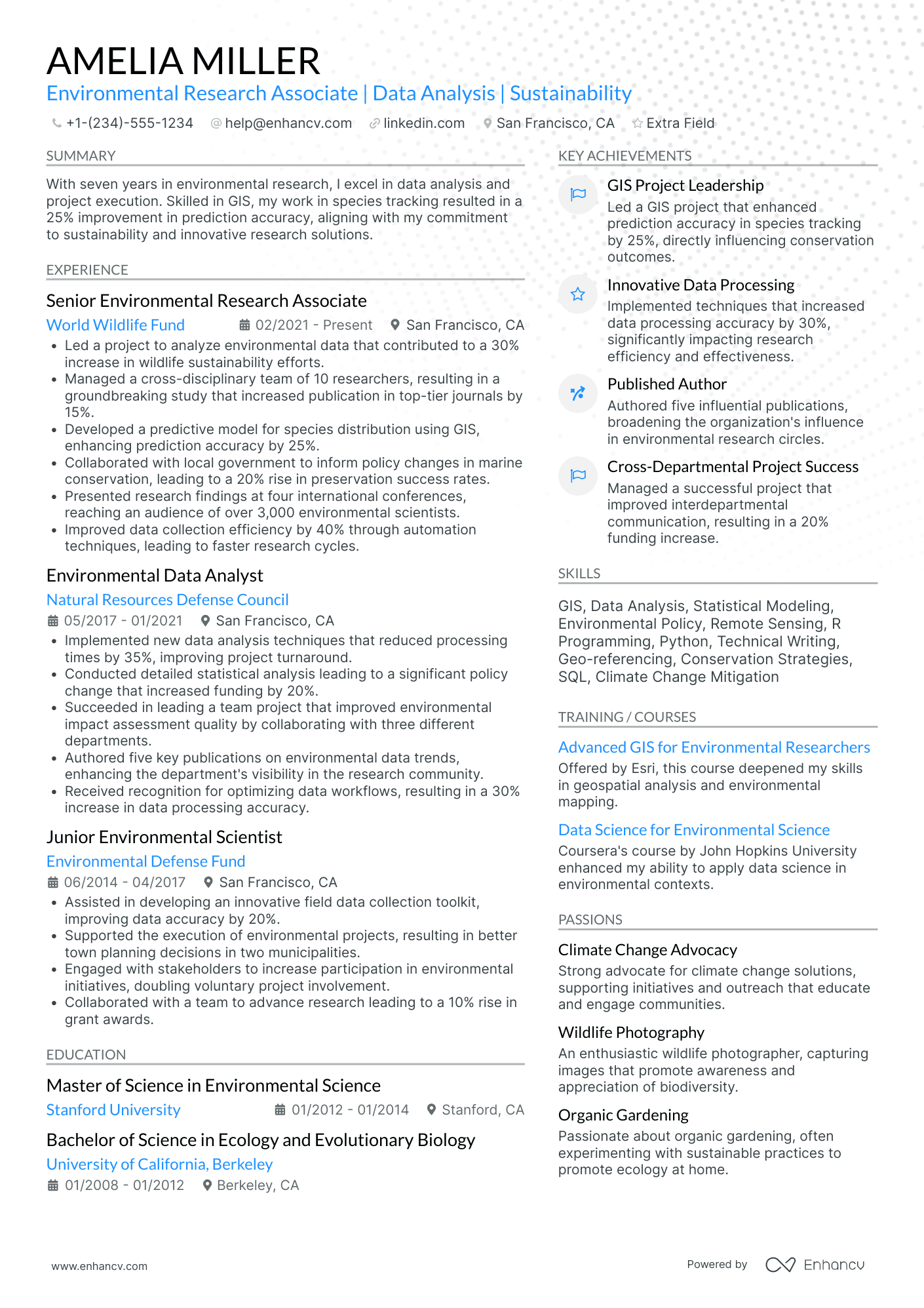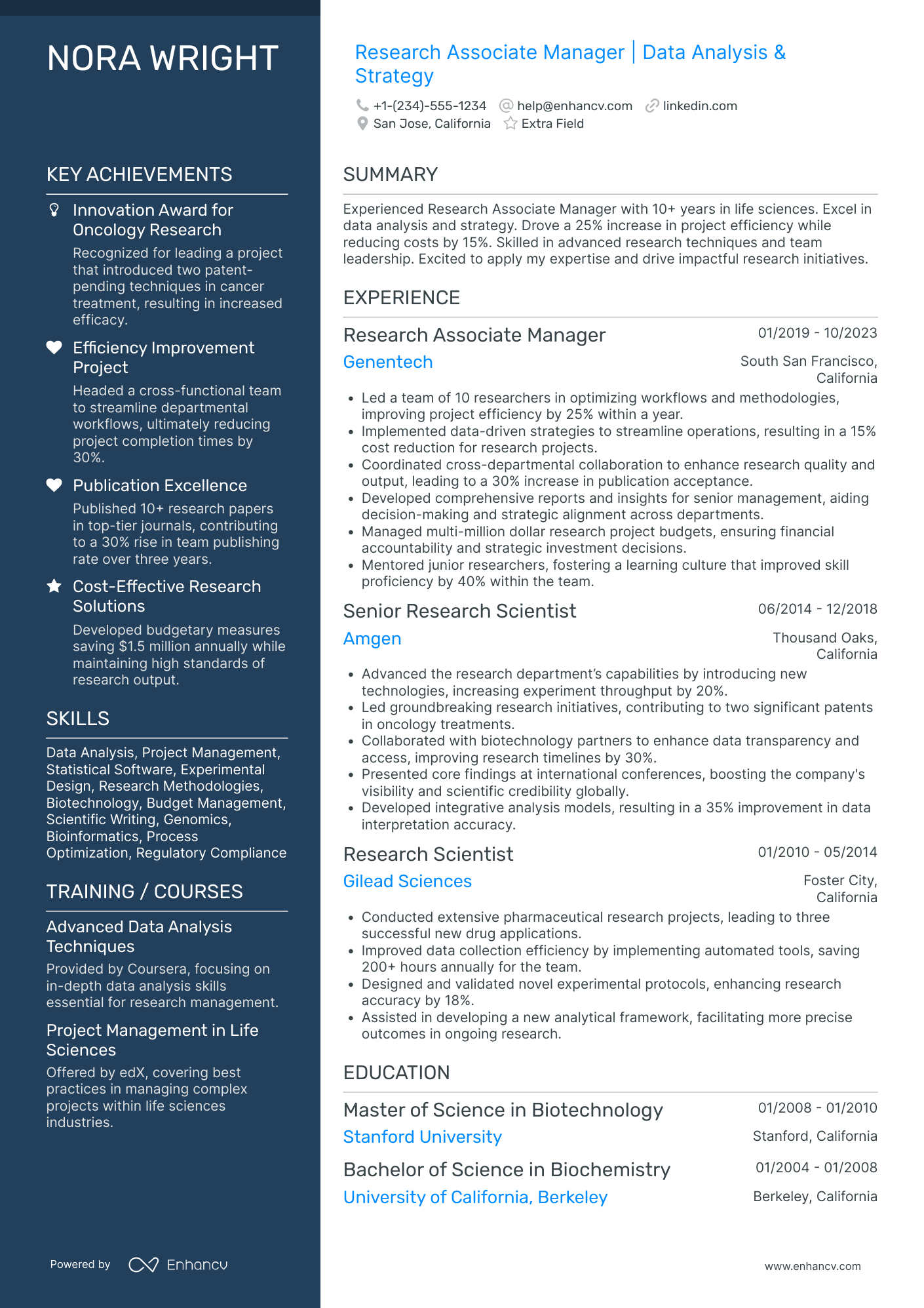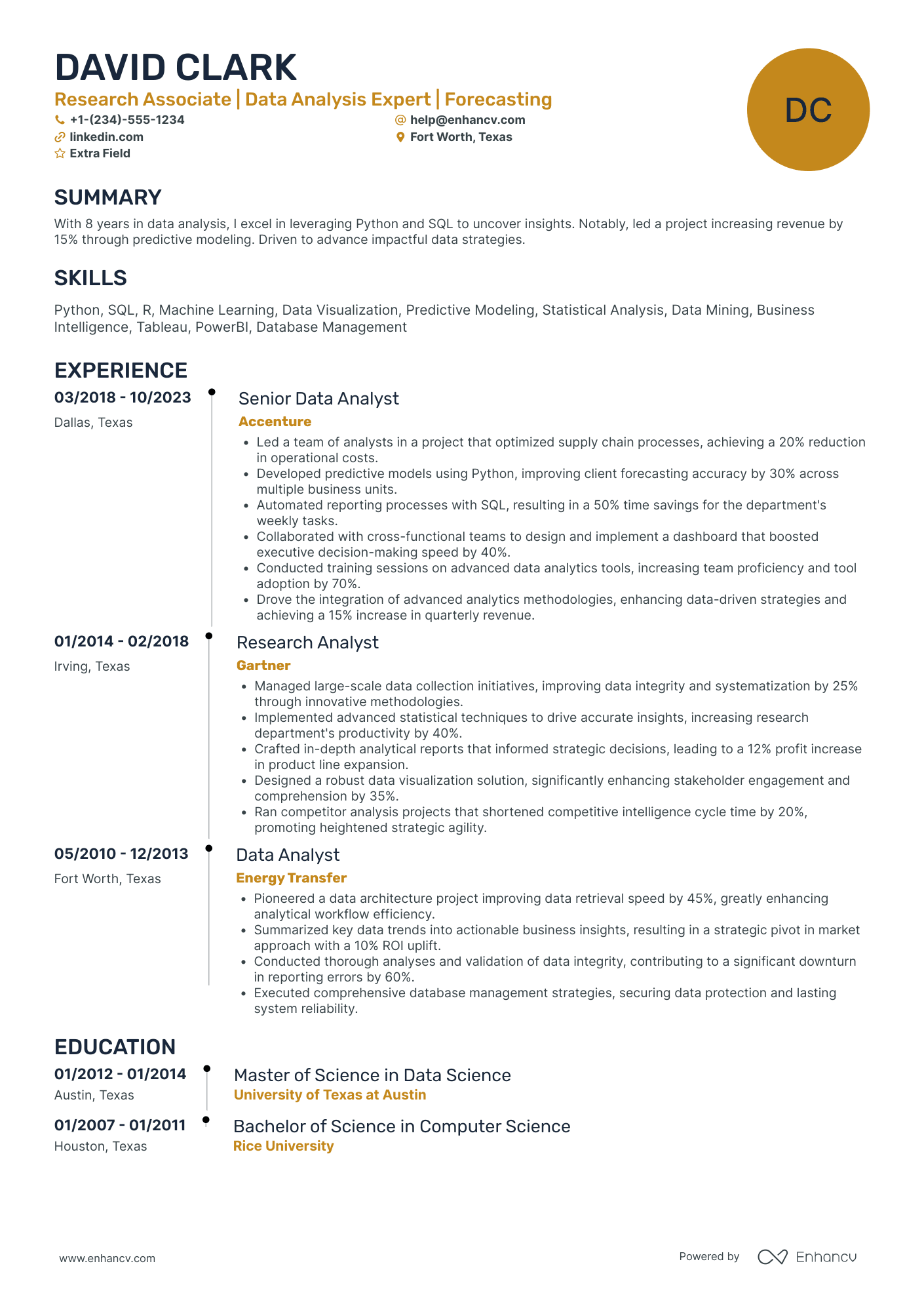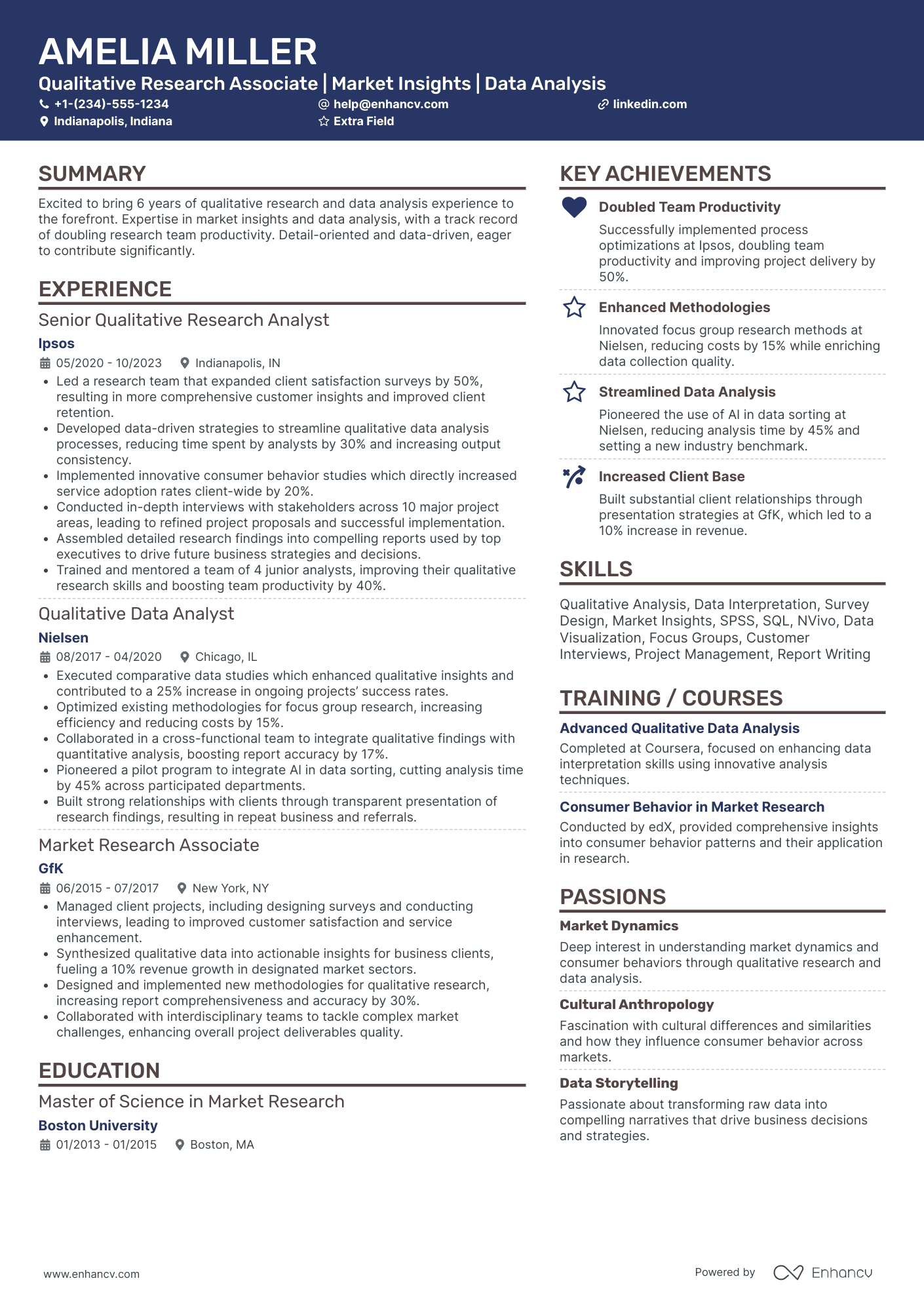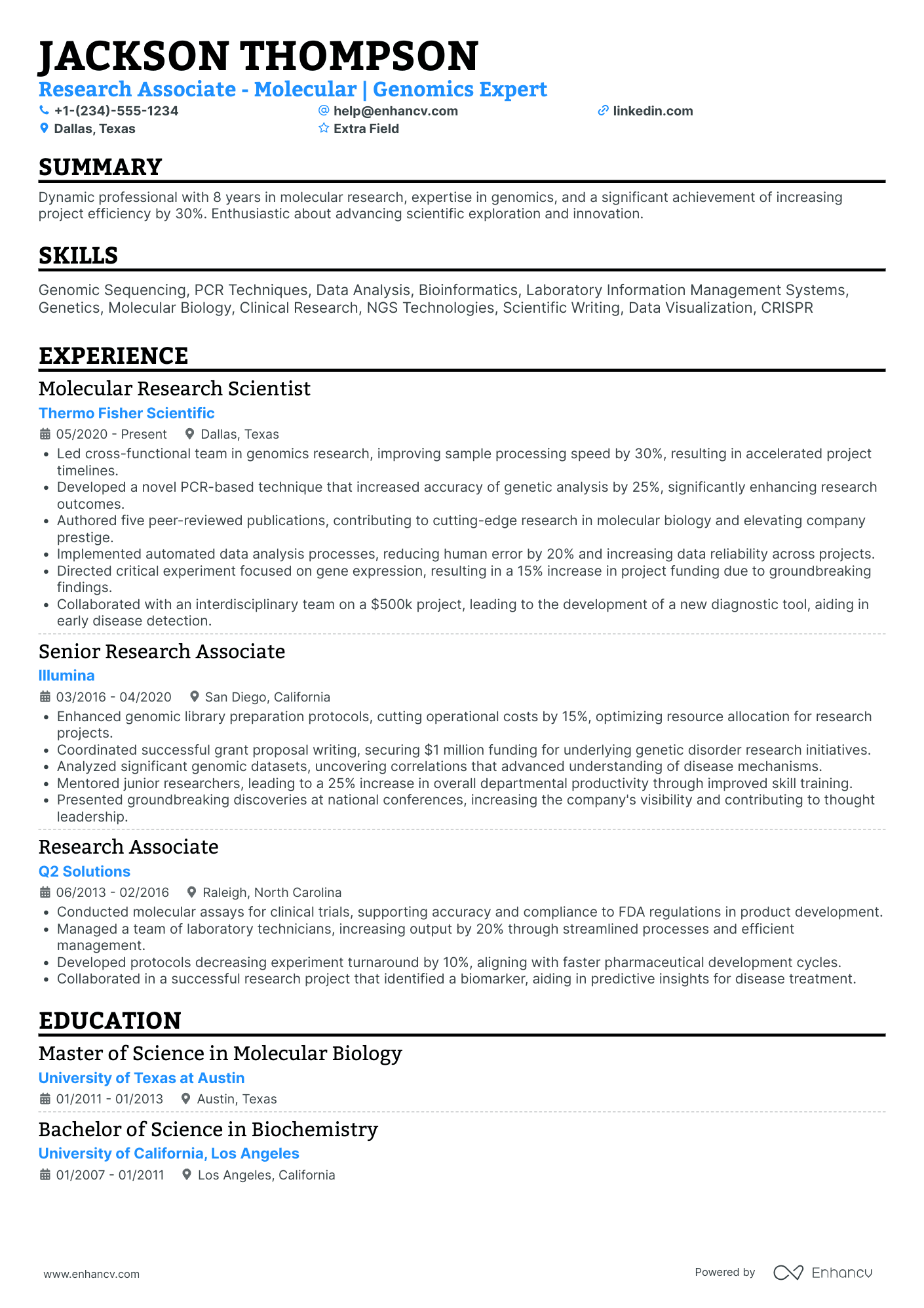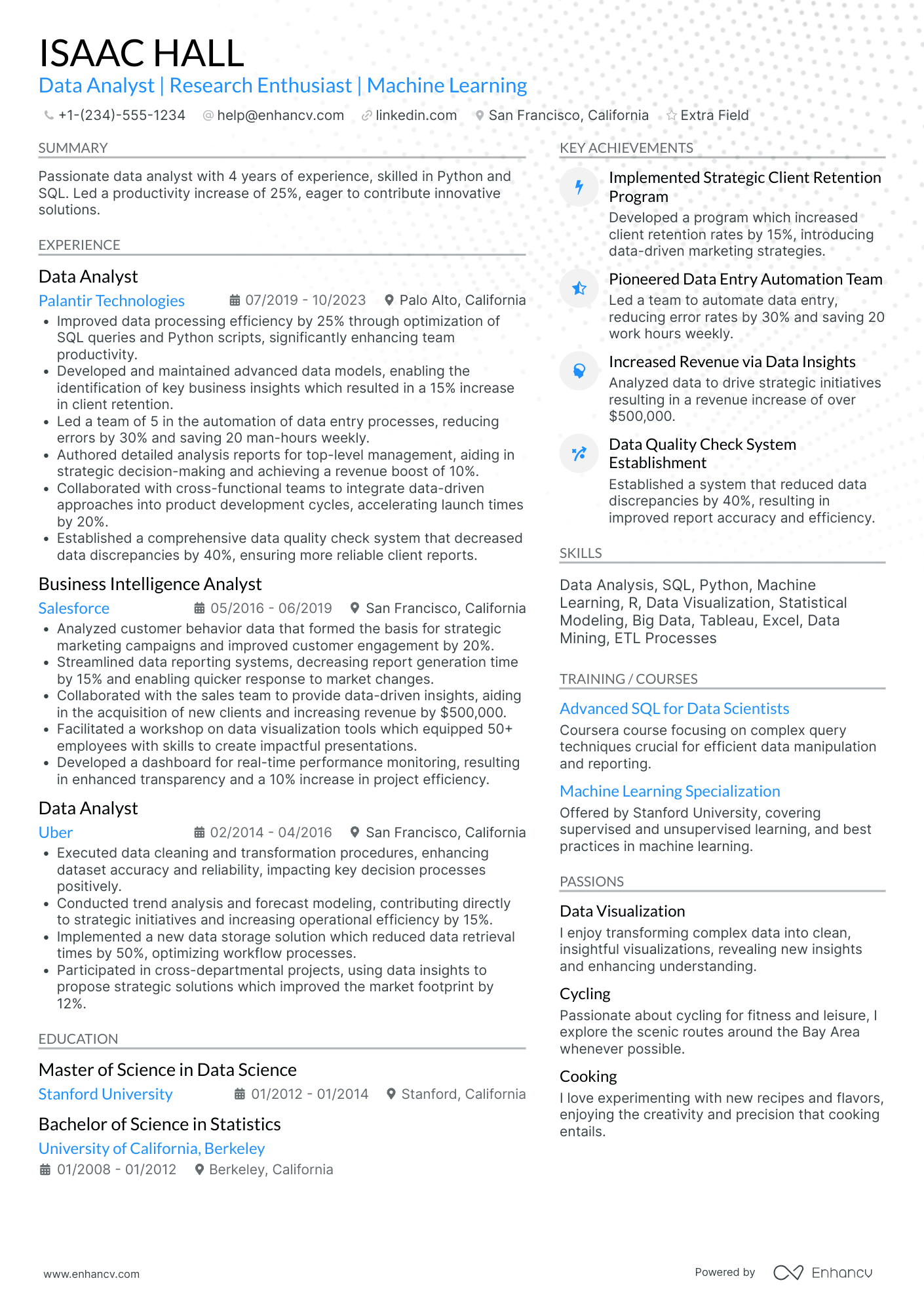As a research associate, articulating the complexity of your research projects in a concise manner on your resume can be a daunting challenge. Our guide provides you with clear examples and strategies to succinctly showcase your scholarly endeavors without oversimplifying your valuable contributions.
- Which sections do you need to include in your resume to meet recruiters' requirements;
- How to write your research associate resume experience section - even if you have don't have little to no work experience;
- Real-life professional examples to guide you how to write the most important research associate resume sections;
- Adding even more sections so your research associate resume stands out with professionalism and your personality.
We've also selected some of the best (and most relevant) resume guides for the research associate role you're applying for:
Formatting the layout of your research associate resume: design, length, and more
When it comes to the format of your research associate resume , you've plenty of opportunities to get creative. But, as a general rule of thumb, there are four simple steps you could integrate into your resume layout.
- If you have plenty of experience, you'd like to showcase, invest in the reverse-chronological resume format . This format focuses on your latest experience items and skills you've learned during your relevant (and recent) jobs.
- Don't go over the two-page limit, when creating your professional research associate resume. Curate within it mainly experience and skills that are relevant to the job.
- Make sure your research associate resume header includes all of your valid contact information. You could also opt to display your professional portfolio or LinkedIn profile.
- Submit or send out your research associate resume as a PDF, so you won't lose its layout and design.
Think about the market’s preferences – a Canadian resume, for instance, could have a different layout.
Upload & Check Your Resume
Drop your resume here or choose a file. PDF & DOCX only. Max 2MB file size.
PRO TIP
The more time and effort you've put into obtaining the relevant certificate, the closer to the top it should be listed. This is especially important for more senior roles and if the company you're applying for is more forward-facing.
The five (plus) definite sections your resume for a research associate job should include are:
- Header with your headline, contact details, and/or a preview of your work
- Summary (or objective) to pinpoint how your success aligns with the role
- Experience with bullets of your most relevant achievements in the field
- Skills to integrate vital job requirements (both technical and personal)
- Your further dedication to the field, showcased via relevant higher education and/or certifications
What recruiters want to see on your resume:
- Relevant research experience and technical skills, such as data analysis, laboratory techniques, or subject matter expertise.
- Strong analytical skills demonstrated through previous research projects or publications.
- Proficiency with relevant research tools and software, like statistical software packages (e.g., SPSS, R, SAS) or laboratory equipment.
- Evidence of problem-solving abilities and critical thinking skills, essential for developing research methodologies and troubleshooting experiments.
- Communication skills, including the ability to clearly articulate findings in written reports and present research results effectively to diverse audiences.
Experts' advice on writing your research associate resume experience
While the excitement and motivation for writing your research associate resume was present in the first hour (or so), you now find yourself staring at the blank page.
The resume experience section is the one that allows you to make a memorable impression by matching job requirement with your past jobs and accomplishments.
To help you write this resume section, here are four mistakes you need to avoid:
- Listing every job you have had so far, including the irrelevant ones. Before that, consider each of your past roles based on relevancy to the role. It may be the case that the job you had 15 years ago may have taught you invaluable skills that are appropriate for the role;
- Including irrelevant work experience items. Those are past jobs that aren't linked with the role you're applying for (or so they seem). Consider how your past jobs will serve your professional presentation: will they be filling in a gap in your work history, or just taking up space?
- Focusing on responsibilities instead of accomplishments. Your research associate resume shouldn't just be telling recruiters what you did in the past - as it's most often the case that candidates have had similar responsibilities. But, rather, the experience section should showcase the success you've attained in each past role, thanks to your unique skill set;
- Consider listing just your professional experience. Any role you've had in the past - e.g. volunteering, internships, etc. - can make it into your research associate resume experience section. Make sure to include it alongside numbers and results.
Two more things you need to remember about your resume experience section.
The first are keywords. Or those specific job requirements that are crucial for the role . Ensure you've integrated them across your experience section to get sorted closer to the ideal candidate profile by the Applicant Tracker System (ATS).
The second are action verbs. Each of your experience bullets should start with a strong action verb, followed by your specific skill and your on the job achievements. Follow this formula to hint to recruiters what your unique value as a professional is.
Still with us? In the next section, we will show you how industry-leading professionals have avoided the four most common mistakes, while integrating keywords and action verbs in their experience section.
- Initiated and successfully completed a 3-year longitudinal study on the effects of environmental variables on crop yield, increasing understanding of sustainable agricultural practices.
- Collaborated with cross-functional teams to analyze over 10,000 data points, improving data integrity by 25% through meticulous quality control protocols.
- Authored and co-authored 5 peer-reviewed publications on research findings, enhancing the company's academic reputation and contributing to scientific discourse.
- Oversaw a team of 4 research assistants, coordinating research on gene therapy techniques which fast-tracked the development of two potential treatments.
- Managed a budget of $500,000 for a high-profile project investigating autoimmune diseases, coming under budget by 10% through efficient resource allocation.
- Established a partnership with a leading university, securing access to advanced research equipment and intellectual collaboration for our team.
- Designed and executed a novel viral vector study, contributing to a 15% reduction in development time for targeted gene therapy applications.
- Presented research findings at 3 major international conferences, raising the profile of the company within the scientific community.
- Developed a proprietary method for cell line development, which has since become a standard protocol within the team.
- Played a key role in a breakthrough research study on Alzheimer’s disease, contributing to a potential treatment path that is currently in phase II clinical trials.
- Mentored 2 junior research associates, supporting their professional development and enhancing research team throughput by 30%.
- Implemented an automated data analysis system which cut down analysis time by 40%, allowing the team to accelerate the research pipeline.
- Leading a pivotal study in the development of a new class of immunotherapies, with early results indicating a 20% increase in efficacy over existing treatments.
- Coordinating with clinical operations to ensure seamless integration of bench research findings with ongoing clinical trials.
- Enhancing lab group productivity by implementing a cloud-based data management system, which has reduced data retrieval times by 50%.
- Contributed to a significant drug discovery project that led to the identification of a novel kinase inhibitor prototype.
- Delivered comprehensive support in the patent application process for three novel chemical entities discovered by the team.
- Coordinated the establishment of a new laboratory, including equipment procurement and SOP development, within a tight 6-month deadline.
- Instrumental in the development of a new analytical technique that improved detection of biomarkers by 40%, which has since been adopted industry-wide.
- Managed the collection and secure transportation of over 5,000 unique biological samples adhering to international research guidelines.
- Facilitated a series of workshops and seminars on advanced genomics techniques, reaching over 100 industry professionals.
- Designed a pioneering study in the field of CRISPR technology, contributing to a groundbreaking method of gene editing that could revolutionize genetic disease treatment.
- Effectively managed laboratory resources to ensure ongoing supply availability, never exceeding budget and often saving costs by negotiating better rates with suppliers.
- Established a comprehensive database for genetic sequencing results, directly enhancing the speed and accuracy of data retrieval for ongoing research efforts.
- Implemented a novel sample preparation protocol, reducing sample degradation by 35% and significantly improving the reliability of downstream analyses.
- Led a successful quality improvement initiative for laboratory processes, achieving a 20% increase in operational efficiency.
- Spearheaded the development of a therapeutic protein that has shown promise in pre-clinical studies for treating rare genetic disorders.
- Engaged in a highly complex research project that mapped out the epigenetic landscape of several cancers, providing valuable insights for the development of targeted therapies.
- Developed a strong collaborative network with leading academic institutions to synergize research efforts in oncology.
- Streamlined data collection workflows, which resulted in a consistent 5-10% reduction in time-to-completion for research project milestones.
The following content includes information from "O*NET OnLine" by the U.S. Department of Labor, Employment and Training Administration (USDOL/ETA). Used under the CC BY 4.0 license. The data represents the top responsibilities present on the task lists for research associate professionals.
Top Responsibilities for Research Associate:
- Present the results of mathematical modeling and data analysis to management or other end users.
- Define data requirements, and gather and validate information, applying judgment and statistical tests.
- Perform validation and testing of models to ensure adequacy, and reformulate models, as necessary.
- Prepare management reports defining and evaluating problems and recommending solutions.
- Collaborate with others in the organization to ensure successful implementation of chosen problem solutions.
- Formulate mathematical or simulation models of problems, relating constants and variables, restrictions, alternatives, conflicting objectives, and their numerical parameters.
- Observe the current system in operation, and gather and analyze information about each of the component problems, using a variety of sources.
- Analyze information obtained from management to conceptualize and define operational problems.
- Study and analyze information about alternative courses of action to determine which plan will offer the best outcomes.
- Collaborate with senior managers and decision makers to identify and solve a variety of problems and to clarify management objectives.
Quantifying impact on your resume
- Detail the number of research projects managed or contributed to, demonstrating project management skills and expertise.
- Specify the percentage of efficiency improvement in data collection or analysis processes you initiated or optimized.
- Include the total amount of funding received from grants or scholarships, highlighting your ability to secure financial resources.
- Quantify the number of published articles or presentations given, showcasing your communication and knowledge dissemination capabilities.
- State the size of the datasets you have worked with to demonstrate your capacity for handling complex data.
- Mention the number of interdepartmental collaborations you participated in, reflecting teamwork and interdisciplinary skills.
- Describe your role in increasing the accuracy or reliability of results by a certain percentage, emphasizing your attention to detail and quality of work.
- Report any cost reductions achieved through your research initiatives, showing your contribution to the financial health of the organization.
Action verbs for your research associate resume
What can candidates do about their resume, if they have no experience
Job requirements can sometimes be answered by other elements you could make more prominent in your research associate resume.
Thus, you'd be substituting your lack of experience with your relevant:
- Education with details of skills you've obtained that align with the job
- Internships and short-term jobs that are once more dedicated to putting your expertise in the spotlight
- Skills section answering basic and - potentially - more specific job qualifications
- Strengths or accomplishments to show the unique value you present, even as a candidate with less or no professional experience in the industry.
Recommended reads:
PRO TIP
List your educational qualifications and certifications in reverse chronological order.
Popular research associate hard skills and soft skills for your resume
Apart from assessing your professional expertise, recruiters are on the lookout for whether your skills align with the job.
Your profile would thus be assessed in regard to your:
- Hard or technical skills - your ability to perform on the job using particular technologies or software
- Soft skills - how you adapt, communicate, and thrive in different environments.
Both types of skills - hard and soft skills - are important for your resume, so make sure to create a dedicated skills section that:
- Lists up to five or six skills that align with the job advert.
- Integrates vital keywords for the industry, but also reflects on your personal strengths.
- Builds up further your skills with an achievements section within which you explain what you've achieved thanks to using the particular skill.
- Aims to always quantify in some way how you've used the skill, as it's not enough to just list it.
What are the most sought out hard and soft skills for research associate roles?
Check out the industry's top choices with our two dedicated lists below:
Top skills for your research associate resume:
Statistical Analysis Software (SAS)
R Programming
Python
Microsoft Excel
Data Visualization Tools (e.g., Tableau, Power BI)
Qualitative and Quantitative Research Methods
Survey Design and Analysis
Database Management (SQL)
Literature Review Techniques
Laboratory Techniques (if applicable)
Critical Thinking
Attention to Detail
Communication Skills
Time Management
Collaboration
Problem-Solving
Adaptability
Organizational Skills
Creativity
Project Management
Next, you will find information on the top technologies for research associate professonals from "O*NET OnLine" by the U.S. Department of Labor, Employment and Training Administration (USDOL/ETA). Used under the CC BY 4.0 license.
Top technologies for Research Associate’s resume:
- IBM SPSS Statistics
- The MathWorks MATLAB
- Google Docs
- Microsoft Word
- Bash
- UNIX Shell
PRO TIP
List all your relevant higher education degrees within your resume in reverse chronological order (starting with the latest). There are cases when your PhD in a particular field could help you stand apart from other candidates.
Research associate-specific certifications and education for your resume
Place emphasis on your resume education section . It can suggest a plethora of skills and experiences that are apt for the role.
- Feature only higher-level qualifications, with details about the institution and tenure.
- If your degree is in progress, state your projected graduation date.
- Think about excluding degrees that don't fit the job's context.
- Elaborate on your education if it accentuates your accomplishments in a research-driven setting.
On the other hand, showcasing your unique and applicable industry know-how can be a literal walk in the park, even if you don't have a lot of work experience.
Include your accreditation in the certification and education sections as so:
- Important industry certificates should be listed towards the top of your resume in a separate section
- If your accreditation is really noteworthy, you could include it in the top one-third of your resume following your name or in the header, summary, or objective
- Potentially include details about your certificates or degrees (within the description) to show further alignment to the role with the skills you've attained
- The more recent your professional certificate is, the more prominence it should have within your certification sections. This shows recruiters you have recent knowledge and expertise
At the end of the day, both the education and certification sections hint at the initial and continuous progress you've made in the field.
And, honestly - that's important for any company.
Below, discover some of the most recent and popular research associate certificates to make your resume even more prominent in the applicant pool:
The top 5 certifications for your research associate resume:
- Certified research associate (CRA) - Association of Clinical Research Professionals (ACRP)
- Certified Clinical Research Professional (CCRP) - Society of Clinical research associates (SoCRA)
- Project Management Professional (PMP) - Project Management Institute (PMI)
- Good Clinical Practice (GCP) Certification - various accredited institutions
- Biotechnology Project Management Specialization (BPMS) - Biotechnology Innovation Organization (BIO)
The content below includes information from "O*NET OnLine" by the U.S. Department of Labor, Employment and Training Administration (USDOL/ETA). Used under the CC BY 4.0 license. The data represents the top associations for research associate professionals.
Top US associations for a Research Associate professional
- Institute for Operations Research and the Management Sciences
- Airline Group of the International Federation of Operational Research Societies
- American Statistical Association
- Association for Computing Machinery
- Council of Supply Chain Management Professionals
PRO TIP
If you happen to have plenty of certificates, select the ones that are most applicable and sought-after across the industry. Organize them by relevance to the role you're applying for.
Recommended reads:
Writing the research associate resume summary or objective: achievements, keywords, dreams, and more
Deciding on whether to include a resume summary or resume objective should entirely depend on your career situation.
If you have:
- Plenty of relevant achievements you'd like to bring recruiters' focus to, make use of the resume summary. Ensure each of your achievements is quantified with concrete proof (e.g. % of cases solved).
- Less applicable experience, utilize the resume objective. Within the objective include a few noteworthy, past successes, followed up by your professional dreams.
As a bonus, you could define in either your research associate resume summary or objective what makes you the perfect candidate for the role.
Think about your unique hard and soft skills that would make your expertise even more important to the job.
These research associate professionals have completely covered the formula for the ideal resume introduction:
Resume summaries for a research associate job
- Dedicated research associate with over 7 years of experience in biomedical laboratory environments, skilled in advanced molecular biology techniques, and a track record of publishing findings in respected journals. Spearheaded a major study on gene expression that contributed to the development of novel therapeutic strategies.
- Seasoned professional with a decade of experience in analytical chemistry, transitioning to biological research to leverage strong background in data analysis and experiment design. Acknowledged for identifying key chemical markers leading to the improvement of industry-standard detection methods.
- Highly motivated individual with 5 years of experience in data-driven environmental research, eager to apply quantitative analysis and project management skills to clinical studies. Notable accomplishment includes leading an award-winning research project on climate change effects on marine ecosystems.
- Experienced financial analyst with a Master's degree in Bioinformatics looking to apply quantitative skills to genetic research. Recognized for developing a predictive model that notably increased investment returns by 20% year-on-year, seeking to contribute to groundbreaking genetic research.
- Aspiring research associate stepping into the professional world of scientific inquiry, keen to apply a fresh outlook and robust academic foundation from a Master's in Microbiology. Determined to assist in cutting-edge research and eager to develop specialized skills within a dynamic lab setting.
- Recent biology graduate aiming to leverage strong analytical skills, a passion for genetic research, and an educational background that includes hands-on laboratory experience. Enthusiastic about contributing to meaningful research that advances understanding in the field of genomics and molecular biology.
Optimize your resume summary and objective for ATS
Drop your resume here or choose a file.
PDF & DOCX only. Max 2MB file size.
Average salary info by state in the US for research associate professionals
Local salary info for Research Associate.” Source: My Next Move, National Center for O*NET Development. Accessed 10/15/2024
| State | Average Salary (in USD) |
|---|---|
| US National Average | $83,640 |
| California (CA) | $82,870 |
| Texas (TX) | $86,510 |
| Florida (FL) | $78,830 |
| New York (NY) | $99,480 |
| Pennsylvania (PA) | $71,440 |
| Illinois (IL) | $101,880 |
| Ohio (OH) | $88,930 |
| Georgia (GA) | $78,320 |
| North Carolina (NC) | $101,190 |
| Michigan (MI) | $91,610 |
Taking your research associate resume to the next level with these four additional resume sections
Your research associate resume can feature a variety of skills (both hard and soft) in diverse sections. Choose those that align best with the job requirements and reflect your suitability for the company culture.
Consider these four additional resume sections recommended by our experts:
- Languages - State any languages you are proficient in and your level of proficiency. This demonstrates your commitment to communication and potential for international growth.
- Projects - Highlight up to three significant projects you've completed outside of work, showcasing skill development. Include a link to your project portfolio in the research associate resume header, if applicable.
- My Time - How you allocate your time outside work can indicate your organizational skills and cultural fit within the company.
- Volunteering - Detail causes you're passionate about, roles you've held, and achievements in volunteering. Such experiences likely have honed a range of soft skills crucial for your dream job.
Key takeaways
Securing your ideal job starts with crafting a compelling research associate resume. It should not only highlight your professional strengths but also reflect your personality. Key aspects to remember include:
- Choose a clear, easily editable format, allowing more time to focus on the content of your resume;
- Emphasize experience relevant to the job, focusing on your impact on the team;
- Opt for a resume summary if you have extensive professional experience, and a resume objective if you're just starting out;
- Include technical skills in the skills section and interpersonal skills in the achievements section;
- Recognize the importance of various resume sections (e.g., My Time, Projects) in showcasing both your professional abilities and personal traits.
Research Associate resume examples
By Experience
By Role
